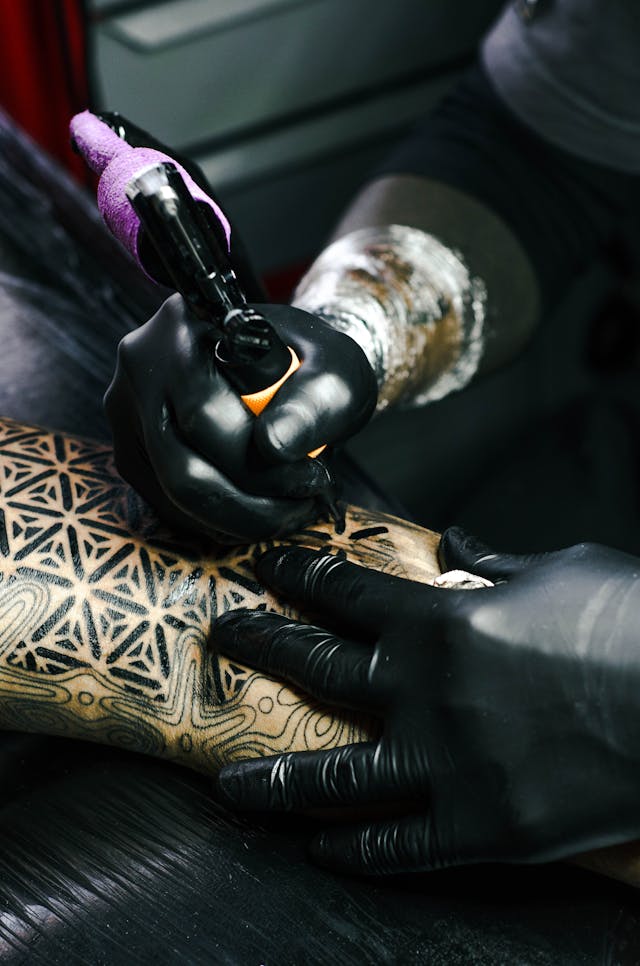If you’re a tattoo artist, you know your gloves are more than just a box of supplies sitting on your workstation—they’re your second skin. With your reputation (and your client's safety) on the line, the right pair of gloves can make all the difference. But with so many options on the market, how do you choose the best disposable gloves for tattooing? Let’s break down the essentials.
Why Gloves Matter So Much in Tattooing
Tattooing is all about precision, cleanliness, and comfort. Disposable gloves protect both the artist and the client from potential cross-contamination. They also help maintain a sterile working environment, which is critical for preventing infections. Besides safety, the right gloves should allow you to work comfortably for hours at a time without losing sensitivity or dexterity.
Nitrile, Latex, or Vinyl: What’s the Best for Tattoos?
There are three main materials for disposable gloves—nitrile, latex, and vinyl. Here’s a quick breakdown of each and why some shine better than others for the tattooing world.
Nitrile Gloves: The Gold Standard

Nitrile gloves have quickly become the top choice for tattoo artists, and for good reason. Here’s why:
-
Allergy-Friendly: Unlike latex, nitrile is hypoallergenic. It’s perfect for artists or clients with latex allergies, keeping everyone safe and comfortable.
-
Durability: These gloves are tough. They’re puncture-resistant, which means they can withstand the demands of tattooing—whether it’s the needle, inks, or sharp tips.
-
Sensitivity & Dexterity: Nitrile gloves offer fantastic tactile sensitivity at the right thickness, so you can still feel the vibration of the machine and delicate details. Plus, they form-fit to your hands, making them comfortable to wear during those long sessions.
For most artists, nitrile gloves strike the perfect balance between safety, durability, and comfort.
Latex Gloves: Classic But Risky

Latex gloves used to be the go-to for many tattoo artists, and they still have their merits.
-
Comfort and Flexibility: Latex provides an excellent, snug fit that feels natural. It offers great tactile feedback, which is important for those fine details in your work.
-
Risk of Allergies: The downside? Latex allergies are common—both for artists and clients. This makes latex a riskier choice since you never want to accidentally trigger a reaction. If you or your clients have no latex sensitivity, these gloves can be a comfortable option, but for many, it's not worth the gamble.
Vinyl Gloves: Budget-Friendly, But Are They Worth It?

Vinyl gloves are typically the cheapest option, but they’re not the best choice for tattooing.
-
Lack of Durability: Vinyl gloves are more prone to tearing and don’t hold up well to the demands of tattooing—not exactly the reassurance you want when you’re holding a tattoo machine.
-
When to Use Them: Vinyl gloves might be okay for prep work or general cleaning, but when it comes to tattooing itself, they fall short of nitrile or latex.
Key Features to Look for in Tattoo Gloves
Now that we’ve talked about materials, here are some other important features to look out for:
-
Black Color: Most tattoo artists prefer black gloves, and for good reason. Black gloves don’t show ink stains, which helps you keep a clean and professional appearance during sessions.
-
Textured Fingertips: This feature offers a better grip on your tattoo machine, ensuring control during even the most delicate lines.
-
Thickness: Look for gloves that are thick enough to provide protection but thin enough to maintain dexterity. A thickness between 4-6.5 mil is usually a good balance for tattoo work.
Our Recommendation: Go Nitrile, Go Black
For most tattoo artists, nitrile gloves are the way to go. They offer the right mix of safety, comfort, and durability. Plus, black nitrile gloves look sleek and stay professional throughout your session—no ink stains ruining your flow.
Final Thoughts
Choosing the right gloves might seem like a small detail, but in the tattoo industry, details matter. The gloves you use impact your comfort, your client's safety, and the quality of your work. If you want to feel like you have complete control of your tools while ensuring maximum protection, our Raxwell Powder-Free Black Nitrile Gloves are your best bet.

